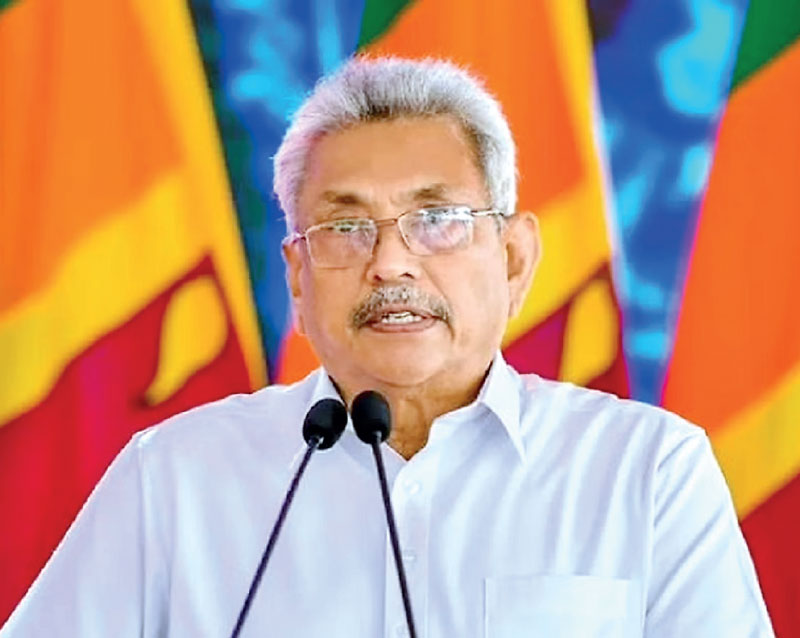Saturday Feb 14, 2026
Saturday Feb 14, 2026
Monday, 4 July 2022 00:40 - - {{hitsCtrl.values.hits}}

President Gotabaya Rajapaksa
 In his address to the nation on 11 May, the President committed to “enact a Constitutional Amendment that would restore the substance of the 19th Amendment” (my translation from the video record, because this speech is missing from the President’s websites).1
In his address to the nation on 11 May, the President committed to “enact a Constitutional Amendment that would restore the substance of the 19th Amendment” (my translation from the video record, because this speech is missing from the President’s websites).1
By this time, he had seen the steadfastness of the Aragalaya and the nationwide support they had. It is reasonable to assume that former Finance Minister Sabry had briefed him that there would be no immediate support from the IMF for the imports of fuel and other essentials necessary to keep the economy functioning and that it was difficult to obtain bridge financing from other sources. The unconditional commitments made in that speech appear to have been intended to address these concerns, two days after the fiasco of the attack on GotaGoGama by the former Prime Minister’s followers and the subsequent dissolution of the Cabinet.
So now, almost six weeks after that address, the official text of the 22A has been made public. It reestablishes the Constitutional Council and allows for fresh appointments to be made to the Independent Commissions, giving the people some confidence that inquiries into bribery and corruption will be conducted properly and that the Election Commission will not include party loyalists.
However, the Amendment approved by Cabinet on 27 June does not restore the content of the 19A; it falls short of the President’s commitment to the nation made on 11 May. But with three changes, we may still be able to keep the President true to his solemn commitments. Many more improvements are desirable, but below are the essential and minimalistic changes that can easily be done through commitments to the Supreme Court when the text is ruled upon for consistency with constitutional provisions, and then implemented at the committee stage.
No portfolios for the President
The 19A did not permit the President to hold any portfolios. Under an interim provision, the then President was allowed to assign himself the subjects and functions of Defence, Mahaweli Development, and Environment. His successor could not assign himself any subject or function. However, the gazetted 22A would allow the President to hold the defence portfolio.
The President’s Constitutional role as Commander-in-Chief does not require him to serve as Minister of Defence. If that was the case, the 19th Amendment which precluded the President from holding any portfolio could not have received clearance from the Supreme Court. The most powerful Commander-in-Chief in the world is the President of the United States of America. It is well known that there is a Secretary (Minister) of Defence in the United States.
Remove interim powers of President
Article 44 of the Constitution as amended by 20A, gave the powers of appointing ministers, assigning their subjects and functions, removing them, etc. to the President alone. Consultation with the Prime Minister was only when considered necessary. The Prime Minister had no real power. The 22A proposes to change that by requiring those powers to be exercised “on the advice of the Prime Minister.” This is good.
However, the coming into effect of this commendable change is postponed to the future by stating that until the dissolution of the present Parliament, the President will make all those decisions in consultation with the Prime Minister (not on the advice of the Prime Minister). Unlike President Sirisena, this President was elected under the Constitution as amended by 19A. He and those who voted for him were fully aware of the powers the Presidency had under the then operational Constitution.
This President has admitted that his decisions about delaying going to the IMF and in banning fertiliser and agrochemicals were wrong and that he is a failure. His actions over the past 2.5 years have caused material harm to citizens who suffering on the roads. There is no reason to give him interim powers so that he can continue to take more wrong decisions and cause more damage.
Keeping these interim provisions will fail to communicate responsiveness to the people’s demands as intended the 11 May address. They will also fail to signal to the world, especially to those who can influence decisions on bridge financing and restructuring debt, that material changes are being made to the over-centralised structure of government that led to the present crisis.
The solution is to remove the interim provisions, thereby restoring 19A as promised on 11 May.
Remove the President’s discretion to dissolve Parliament early
By amending Article 70 of the Constitution, 20A gave the authority to the President to dissolve Parliament at his sole discretion after two and a half years (in the case of this Parliament after February 2023, just eight months from now). If the President is to remain true to his word that this Constitutional Amendment will restore the content of the 19th Amendment, this must be changed back to the four and a half years as set out in 19A.
One cannot claim to have restored the balance with Parliament by preserving the sole prerogative to dissolve it, eight months from now. If this provision had been in place in 2018 during the anti-Constitutional coup, the principled resistance of the Speaker and the people would have been easily negated by this power. It is wrong for one person to have untrammelled authority to override the mandates earned by 225 Members of Parliament.
In sum
The present crisis is not simply about gas and fuel shortages and runaway food price inflation. It is a crisis of trust. The protestors on streets are asking for accountability for errors made by those in power that destroyed their dreams.
If the President does not do what he promised to do on 11 May, he will only widen the trust deficit. If he is unwilling to go back to the powers that he had when elected in November 2019 and still seeks to exercise authority over Parliament, it will be evident that he refuses to take any responsibility for the devastation he caused. There will be no all-party government, no bridge financing, and the protests will continue. It is difficult to predict where and when things will go out of control. If the President wants to be thought of as a man of honour, he has no alternative but to concede to these minimal changes and push through the amended 22A with the required 150 votes.
Footnote:
1“දහනව වන සංශෝධනයේ අන්තර්ගත දෑ නැවත බලාත්මක වන පරිදි, ව්යවස්ථා සංශෝධනයක් කිරීමටද මා කටයුතු කරනවා” At 7:39 of https://ceylontoday.lk/2022/05/11/watch-president-gotabaya-rajapaksa-delivers-special-statement/